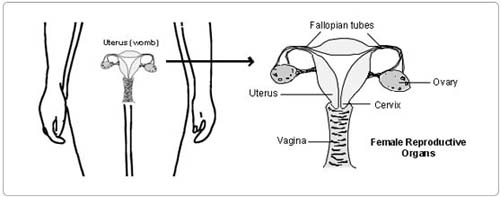What is it?
The doctors think you have a pregnancy in a Fallopian tube or in an ovary. This is called an ectopic pregnancy, meaning "not in the right place". An ectopic pregnancy will not live. It can cause you life-threatening internal bleeding. It may have happened because of scarring from earlier infection in or around the tubes. Blood tests and scans will be of some help in finding out what is going on. The only certain way is to look inside your tummy. A special narrow telescope - a laparoscope is used. An ectopic pregnancy may be able to be dealt with through the laparoscope. The ectopic pregnancy may be able to be taken out without removing the tube and ovary. This is called a salpingostomy. If not, the tube has to be taken out and possibly the ovary as well - salpingectomy or salpingo-oophorectomy .

The Operation
You will have a general anaesthetic and be completely asleep. A small cut is made in the skin just below your tummy button. The laparoscope is inserted through the tummy wall, and your tummy is inflated with some carbon dioxide gas. This gives the surgeon a good view of the inside of your pelvis (the lower part of your abdomen where your womb, tubes and ovaries are placed). He may also pass other instruments into the tummy through one or two other cuts. These will help him to get a better view and let him do the operation. He will check that there is in fact an ectopic pregnancy. He will deal with the problem by removing the pregnancy and any tissues attached to it. Finally, a stitch is put into each skin wound. It usually takes about 45 minutes. If the surgeon cannot manage to do the operation through a laparoscope, he will need to make a bigger cut (4-6 inches/ 10-15 cms) in your tummy. Whichever operation is done, only 50% of women become pregnant again. And there is a 1 in 10 chance of any future pregnancy being ectopic.
Any Alternatives
If you leave things as they are, you will be in great danger of life threatening blood loss. Drugs and medicines will not help. You must not delay.
Before the operation
All preparations need to be done very fast. The most important thing is for you to get to hospital as soon as possible. Check you have a relative or friend who can come with you to the hospital, take you home, and look after you for the first week after the operation. Sort out any tablets, medicines, inhalers that you are using. Keep them in their original boxes and packets. Bring them to the hospital with you. On the ward, you will be checked for past illnesses and will have special tests to prepare you so that you have the operation as safely as possible.. Please tell the doctors and nurses of any allergies to tablets, medicines or dressings. You will have the operation explained to you and will be asked to fill in an operation consent form. Bleeding from the vagina will not put off the operation.
After - In Hospital
There may be a fine plastic drain coming out of your tummy. This will drain out any blood from inside the pelvis. This is usually removed 12 to 24 hours after the operation. You will have a small/thin plastic tube (a drip) in an arm vein. This gives you salt and sugar and water, and sometimes blood, for a day or so from a plastic bag on a stand. You may be given oxygen from a face mask for a few hours if you have had chest problems in the past. You will have a sanitary pad in place. You may have some discomfort in the tummy and shoulders caused by the gas inside the tummy. Injections will help. After this, mild painkillers should be all you need. There may be slight vaginal bleeding or a dark-stained discharge. This should stop after a few days. Your next period may not appear on time. Only use external pads for any bleeding. Do not use tampons for six weeks. Some blood tests will be done to check you are not anaemic. A general anaesthetic will make you slow, clumsy and forgetful for about 24 hours. Do not make important decisions during that time. The nurses will help you with everything you need until you can do things for yourself. Most likely you will have a catheter in your bladder that allows the urine to drain freely into a collecting bag. This catheter is removed 24 hours after the operation. When the catheter is removed, the discomfort of the operation can make it difficult to pass urine and empty the bladder. . If you cannot get the urine flowing properly after six hours, contact the nurses or your doctor. You will be able to take a bath or shower as often as you want but try to keep the wound(s) dry for one week. You will be given an appointment for an Out Patient check up a week or so after you have left hospital. The result of the examination of the tissue will be ready then. The nurses will advise about sick notes, certificates etc.
After - At Home
You may feel very tired for two to three days. You will be back to normal after three weeks or so. Make sure you are going home by car with your relative or friend. At home, go to bed and rest for at least six hours. You can usually go back to normal activity and work after a week. Avoid heavy exercise for three weeks. You can get back to driving after three days. You can resume sexual relations as soon as you feel comfortable enough. You will need to discuss contraception and future pregnancy with your partner and your doctor. If you wish, you can try for a pregnancy two months after the operation. You should be able to return to a light job after about two weeks, but you may not be able to cope with a very busy job for up to six weeks.
Possible Complications
As with any operation under general anaesthetic there is a very small risk of complications related to your heart or you lungs. This is slightly increased in an operation like this because everything is happening very quickly and also because if you have any ongoing bleeding because of the ectopic pregnancy, you are not in the best possible shape before the operation. However, the tests that you will have before the operation will make sure that you can have the operation in the safest possible way and will bring the risk of such complications very close to zero.
Ectopic pregnancy is a serious condition. Blood transfusion is sometimes needed. If you have lost a lot of blood, you may need to stay much longer in hospital. If the pregnancy can be removed through the laparoscope, you will recover more quickly.
The chances of complications after the operation are overall 3-4% and occur more frequently when there is difficulty in removing the pregnancy. Minor complications include small bruising or an infection of the wound that can be cured by taking antibiotics for a few days. More serious complications include ongoing bleeding or damage to one of the organs in the abdomen and may require another operation to deal with them, You are likely to feel very sad following the loss of your pregnancy. Support from the miscarriage group may help you and your partner cope.
Advanced Reproductive Technology
- In Vitro Fertilisation (IVF)
- Intracytoplasmic Sperm Injection (ICSI)
- Donor egg and embryo programs
- In Vitro Fertilisation (IVF)
- Pre-implantation genetic diagnosis (PGD)
- Surrogacy programs
Dental Videos





